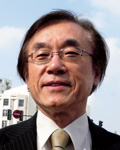|

August 2012 saw the Olympic Games in London. China's Olympic medals count ranked near the top. In the 2008 Olympics in Beijing , China's gold medalists outnumbered that all of the other countries participating in the Games. In the arena of sports competition, athletes from all countries and regions are competing under the same rules, in spite of creed, social systems, nationality and religion.
And what of China's achievements in the economic sphere? In 2010, China's GDP surpassed Japan to become second-largest economy in the world, and China is now quite likely to earn "gold" in the economic arena.
In 2003, per-capita income in China was only about $1,000, but in 2011, it quadrupled to $5,414. Of course, despite these achievements, the Chinese people's per-capita income is only one eighth of their Japanese counterparts. Moreover, China's hosting of the 2008 Beijing Olympics and the 2010 World Expo in Shanghai has attracted attention from all over the world. But the People's Daily, the official newspaper of the Communist Party of China (CPC), argues that the attention is temporary. The Chinese now must go from "looking to the rest of the world" to "getting integrated with the world." It's no exaggeration to say that the Chinese economy and the Chinese people are marching toward internationalization.
China's advances in spacecraft and high-speed railway development have also made a mark on the past decade. In June, manned spacecraft Shenzhou-9 sent a female astronaut into space for the first time and successfully docked at the Tiangong-1 Space Station. According to a Xinhua report on June 24, the U.S. magazine Atlantic Monthly called the event a comment on this event, with "Hu Jintao's 'Kennedy moment'." China has apparently already made plans for a moon landing, although the time is not fixed yet. When I was working in Beijing in 2001, China was trying to import high-speed railway technology from abroad. Few at that time would have expected that in less than 10 years China would not only develop the technology on its own, but would also build high-speed railways in other countries.
The last decade was not entirely smooth. The country also faced challenges from natural disasters like the massive earthquake in Wenchuan in southwestern Sichuan Province and the mudslide disaster in northwestern Gansu Province's Zhouqu, as well as major incidents in food safety, environmental protection, the outbreak of SARS in 2003, and others. In addition, the global economic crisis (spreading from the U.S. financial crisis and European debt crisis), posed a serious test to the Chinese economy.
In a meeting held by the Central Committee of CPC for non-Party people this July, President Hu Jintao put forward six points on how to deal with the economic tasks of the second half of 2012. He said that the country would strengthen and improve macro control; further promote agricultural modernization; accelerate the transformation of economic development; and improve people's livelihood. These are important points to follow for the next leadership to follow.
Since the founding of the People's Republic of China in 1949, China first focused on political development and then changed to economic development in 1978 when the policy of reform and opening up was adopted. The period of "economy first" entered a new phase after Deng Xiaoping's south tour speech was made in 1992. For example, China became the biggest receipient of foreign capital among developing countries. Meanwhile, foreign companies' exports to China jumped after 1992. By May 2012, foreign investors in China had reached more than 439,300.
Based on China's history since 1949, how shall we define the past 10 years? In short, this decade marks the transfer from "economy first" to an improvement of livelihood.
In this decade, the tenet of the Party and the Chinese Government has been "to build a socialist harmonious society with the Scientific Outlook on Development as guidance." By "harmonious society," the government means to build a society where all social classes enjoy a balance. Society is particularly stressed. Deng put forward his "socialist market economy" theory during his southern tour in 1992, when the focus was on the economy. Some people believe the combination of socialism and a market economy, which were regarded as two opposing concepts, helped China's economic growth and brought stability to the world economy.
The core of "harmonious society" is "human-centered," which means the improvement of people's livelihood. We can offer some examples: further improvement in medical care and social security, education and employment. In 2006, China abolished the agriculture tax that had existed for more than 2,600 years. In 2007, free compulsory education reached the whole country. Meanwhile, urbanization is moving forward. China has made great headway in narrowing the gap among different social classes.
The effort to improve people's livelihood is the second part of Deng's theory. In 2002, China proposed a strategy of empowering the country through science and education. It can be said that China is trying to improve its people's livelihood by effectively making use of its population's potential.
China's strength presented in this past decade, I think, will be reflected through its internationalization, urbanization, culture and innovation.
The author is a chief economist at the Institute for International Trade and Investment in Japan
Email us at: zanjifang@bjreview.com | 